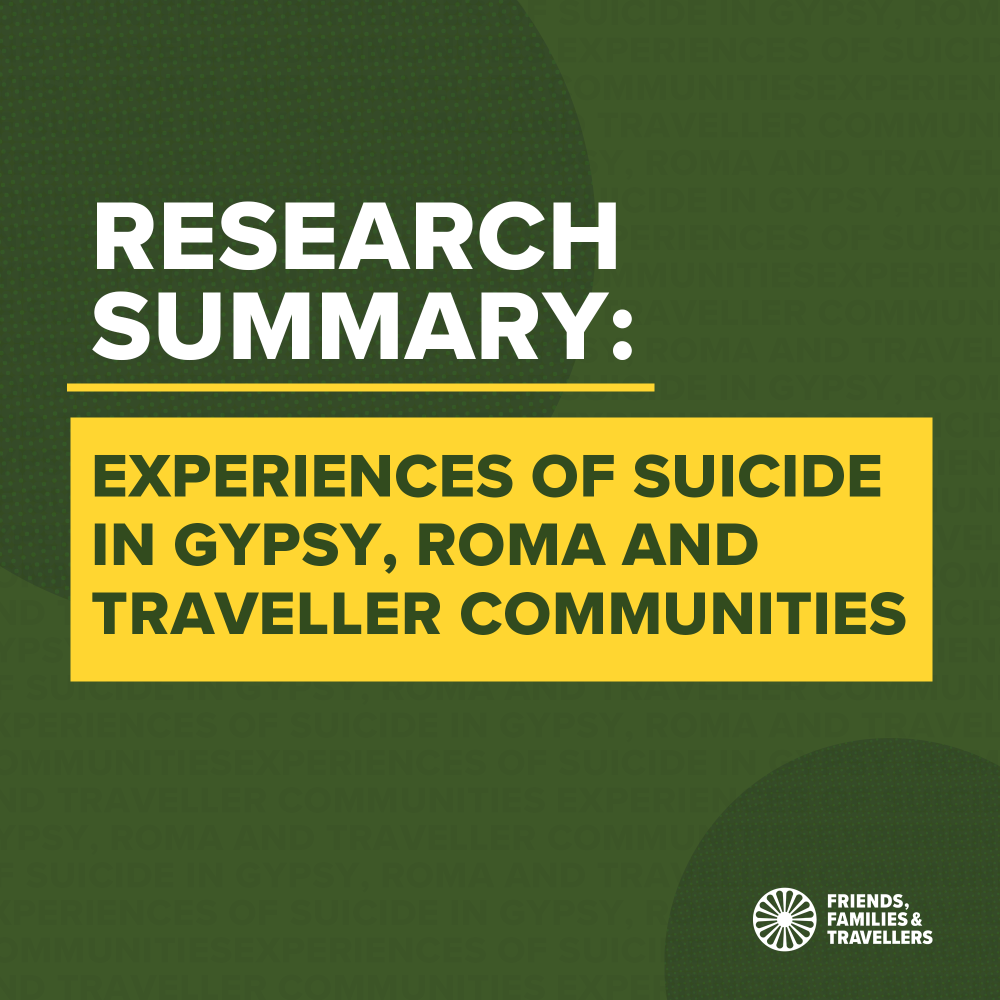Today, Friends, Families and Travellers (FFT) released a research summary offering insights into the experiences of death-by-suicide in Gypsy, Roma and Traveller communities using responses from community members who had experienced the death of a friend or loved-one.
The report highlights contributing risk factors behind the high suicide prevalence within Gypsy and Traveller communities, and offers recommendations on how support around suicide prevention can be improved.
Gypsy and Traveller people are at high risk of suicide compared to the general population – an All Ireland study found that suicide prevalence is six times higher for Irish Traveller women, and seven times higher for Irish Traveller men.
Some of the contributing factors include:
- Economic and financial exclusion, including issues around unemployment, accommodation and financial difficulty;
- Lack of support from mental health and other public health services;
- Stigma around mental health and suicide;
- Criminalisation and loss of traditional ways of life.
One response highlighted stigma and shame around mental illness as a key issue for young people in Gypsy and Traveller communities:
“We make our young think there’s something wrong with them. There’s nothing wrong with them, they are just needing a little help. There is no shame in that, none at all. The stigma needs to go – too many of our young are dying. My beautiful boy has gone because he was too ashamed to seek help”.
On the criminalisation of the nomadic way of life and the new powers under the Police, Crime, Sentencing and Courts Act and its impact on mental health, one respondent said:
“Gypsies and Travellers suffer more than most due to being outcasts. Our way of life is becoming (even more) criminalised, which is likely to further impact mental health in the Travelling communities”.
Another respondent linked the prolific experiences of discrimination and bullying with high suicide rates within Gypsy and Traveller communities, saying:
“when you live in a society which stigmatises you at every opportunity, this is the natural result”.
While there is no data on death-by-suicide within Roma communities in the UK, Roma Support Group reports high rates of depression and anxiety in Roma communities, as well as poor access to mental health services.
To address the disproportionately high prevalence of suicide, the report calls for public health services to:
- Include Gypsy, Roma and Traveller communities as a high-risk group in local suicide prevention planning;
- Work with organisations with strong ties to local communities and ensure support is accessible and not ‘digital by default’;
- Adopt a multi-agency approach to tackle the key determinants of suicide and mental ill-health for Gypsies, Roma and Travellers;
- Consider key social risk and intersectional factors such as self-employment, and unpaid care responsibilities.
This resource is designed to support professionals who provide mental health and care services to Gypsy, Roma and Traveller communities, and offers intimate insight into experiences and wider impacts of death-by-suicide, as well as important recommendations on how change can be implemented.
Speaking about the disproportionate suicide rates and wider impact, Chris McDonagh, an Irish Traveller and Campaigns Officer at Friends, Families and Travellers said:
“Sadly, nearly every Traveller family has experienced, personally or by extension, a suicide. This report gives a glimpse into the mental health problems these families have historically faced.
Suffering with your mental health is nothing to be ashamed of, and more action is crucially needed to prevent any further loss of life.”
Drawing on the importance of this research summary, Rosie Hollinshead, Health Policy & Projects Officer at Friends, Families and Travellers said:
“The first-hand experiences of Gypsies and Travellers included in this research offer an important insight into the high prevalence of death-by suicide, its far-reaching impact, and marks a first steps towards addressing the exclusion of Gypsy, Roma and Traveller communities from mainstream datasets.
Using these findings and recommendations, mental health and care professionals can ensure Gypsy, Roma and Traveller people are recognised as high-risk groups and are considered at every stage of mental health provision, care and suicide prevention planning.”
Help for suicidal thoughts
If you are having thoughts about suicide, it is important to tell someone so that you can get support. Help is available right now if you need it.
You can call the Samaritans 24/7 on 116 123. One Call Away is a Gypsy and Traveller-specific mental health support service, and you can reach them on 07748997617.
You do not have to struggle with difficult feelings alone. Find out more.
[ENDS]
About Friends, Families and Travellers (FFT)
Friends, Families and Travellers is a leading national charity that works to end racism and discrimination against Gypsy, Roma and Traveller people and to protect the right to pursue a nomadic way of life.
Media Contact
Communications Team
Email: [email protected]
Additional Resources
Research Summary: Experiences of Suicide in Gypsy, Roma and Traveller communities. Friends, Families and Travellers. 2023. Read.
Tackling Suicide Inequalities in Gypsy, Roma and Traveller communities. Friends, Families and Travellers. September 2022. Read.

